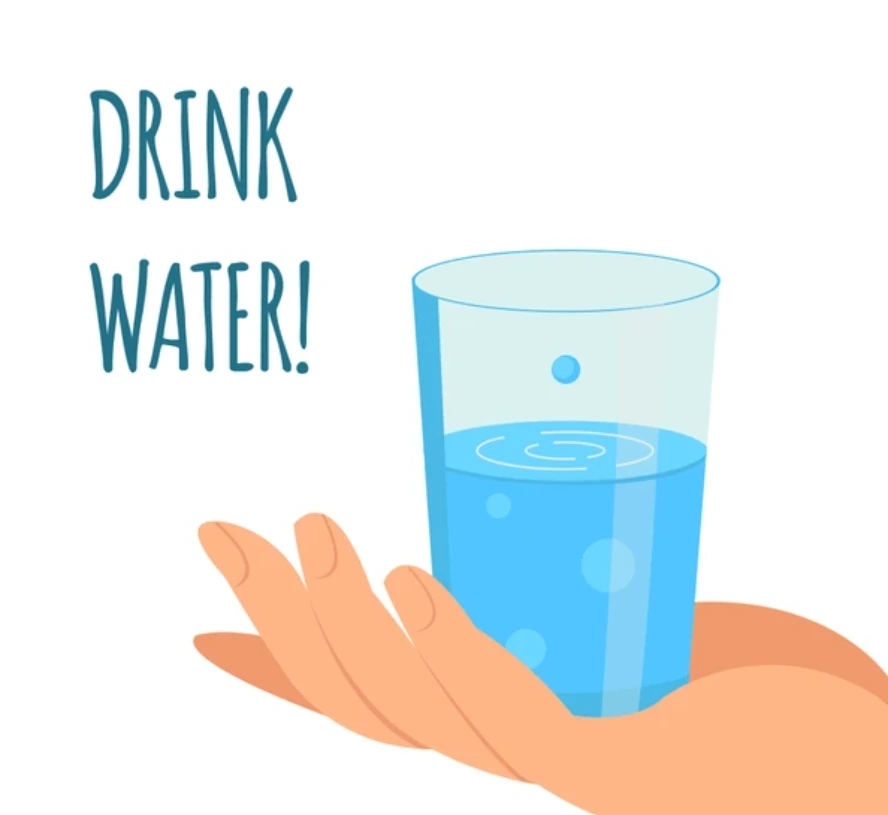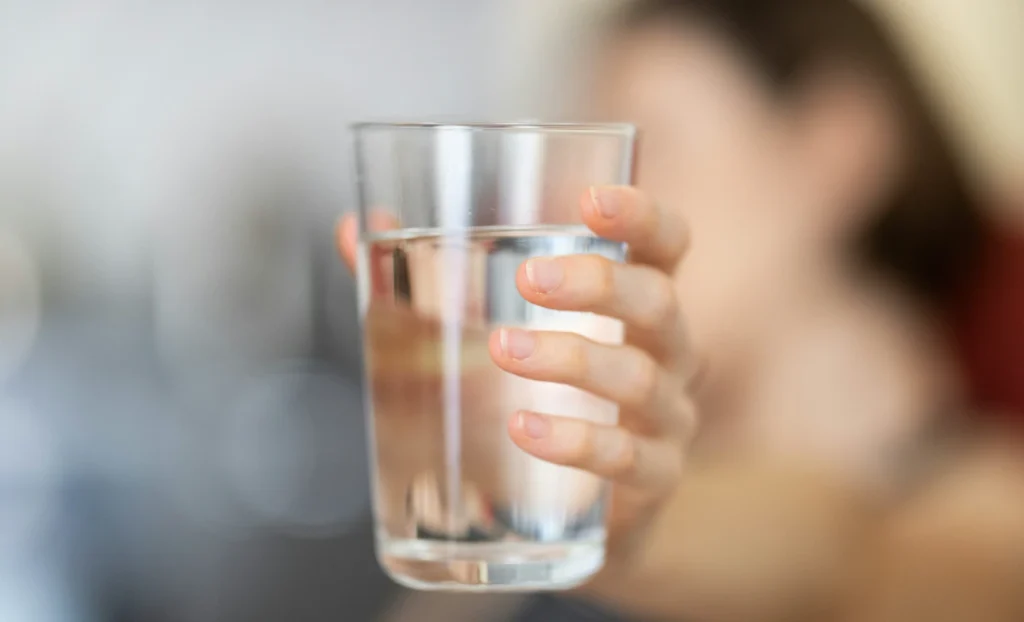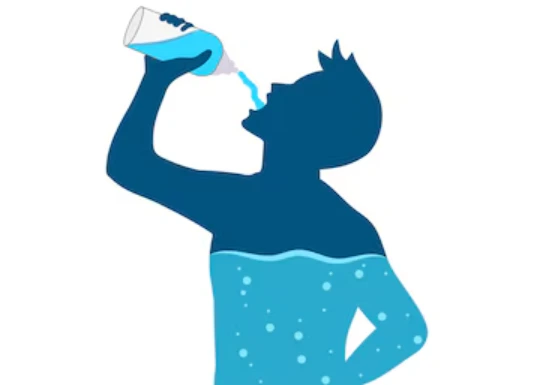INTRODUCTION:

What if I told you staying hydrated could be the key to feeling better, having more energy, and improving your health? As simple as it sounds, one of the most fundamental ways to maintain a healthy body is by drinking ample water, but how much water should you drink each day to remain correctly hydrated?
The reality is, however, while many people use the simple heuristic of “8 glasses a day”, how much you need to drink depends upon several personal contextual factors. Everything from your age and sex to your activity level, the climate you live in, how much exercise you do, or if you have certain health conditions can help determine how much water your body needs.
In this blog, we investigate the specifics about how much water you should drink a day with evidence-based research. We will also briefly cover the benefits of hydration, how to know when you are drinking enough water or too much, and what it means to be dehydrated.
How Much Water Should You Drink a Day
The amount of water you should drink each day varies based on several factors, including your age, activity level, climate, and overall health. One general rule is to consume 8 glasses of water, or about 2 liters a day. In Australia, the recommendation for most adults (according to the National Health and Medical Research Council (NHMRC) is about 2.6 liters a day for men and at least 2.1 liters of fluid per day for women.
However, as I mentioned, this can increase if you are physically active or exercising in hot weather or have health conditions. Listen to your body, drink when you are thirsty, and maintain the color of your urine between a straw yellow and clear as an indication that you have appropriate hydration. Keep in mind that serving as a hydration fluid, water from other sources, such as tea, smoothies, and foods like fruits and vegetables, also contributes to your daily intake.
Factors That Affect Your Water Intake
1. Physical Activity and Exercise
How much water you need will depend on how active you are. Sweating when you exercise is a sign that your body sheds some liquid, so it is important to replace it. You will need more water if your workout is harder.
- Light activity: If you are doing something light like walking or gentle yoga, the extra hydration requirement is minimal. And you can usually drink it straight up to a half gallon or a whole liter per day.
- Moderate to high activity: If you do more intense physical exercise like jogging, swimming, or weight lifting, your overall water intake will need a major boost, up to 2 or even greater still liters of water, on the other hand, because of the length and strain of your workout.
When you are engaging in intense exercise, remember that not only do you lose and need to replenish the quite clearly visible water, but also the electrolytes (specifically sodium and potassium) you sweat out. Water is generally fine for everyday activities, but if you are exercising actively and for a long time, sports drinks with electrolytes can help.
2. Climate and Temperature
The weather you live in obviously affects the amount of water intake that keeps you hydrated. This is particularly significant for Australians as the climate changes a great deal from north to south. Whether you live in a tropical, humid location such as Queensland or a hot, dry outback location, the Australian environment can compromise your hydration requirements.
- Hot climates: If you live in areas such as Western Australia or parts of the Northern Territory, where temperatures can soar, then more water is lost from sweat, requiring you to drink more to prevent dehydration.
- Cold climates: Hydration needs to be taken care of, whether it’s cold, warm, or hot interior. Cold air is dry, and that alone can dehydrate you without your knowledge. Furthermore, people tend to consume fewer fluids in the winter, so you may not always want a drink, but your body still needs fluids for proper function.
3. Age and Health
As we grow older, our bodies require water differently. Elderly people have a decreased sense of thirst and their kidneys are less effective at retaining water, leading to an increased risk for dehydration.
- Elderly individuals: Older individuals must regulate their water consumption more vigilantly, as they do not feel thirsty even if they are dying from dehydration.
- Certain health conditions: Some conditions, such as diabetes, kidney disease, or some cardiovascular diseases, can affect your hydration needs. For instance, those with diabetes may need to go more often and thus have a greater need for water. If you have a medical condition that affects your fluid needs or are on medication, always check into this with your healthcare provider, of course.
4. Diet and Fluid Intake
The more you eat, the more water your body requires. Hydrating vs dehydrating foods and beverages. For example:
- High protein or salt diets: Protein and salt-rich diets increase the amount of water your body needs to flush out surplus nutrients.
- Caffeinated beverages: Some people have in their minds that tea and coffee can contribute towards their fluid intake for the day, but they are mild diuretics, therefore making you pass more water out of the body. But if you take out caffeine, another remover of water from your body, then be sure to add it back in with more water.
- Alcohol: Alcohol also acts as a diuretic, which means that it increases urination frequency, leading to additional water loss. This is why it is important to drink plenty of water before, during, and after consuming alcohol.

How to Monitor Your Water Intake: Signs You’re Drinking Enough
The color of urine is used as a dehydration test. This reminds me of something I learned in my training: urine should be a pale yellow or light straw and clear. Make sure you drink more water if your urine turns dark yellow or amber a possible sign of dehydration.
Also, you just need to listen to your body, that is a thirst signal. Thirst is a natural reaction to tell you your body needs water in its usual place. Do not wait to get thirsty before you wash, by then the mild dehydration may have already begun.
Benefits of Drinking Enough Water
Being well hydrated also means that your body benefits from a load of other things. Here are just a few:
Improved Physical Performance
Muscle action and physical endurance require hydration. When you are even mildly dehydrated, your muscles cramp more easily and work less efficiently. Hydrate: Make sure to stay hydrated, whether you are running or at the gym.
Better Digestion
Water plays a key role in digestion. It helps dissolve nutrients and move food along the digestive tract, ensuring that your body absorbs the nutrients from your food efficiently. Drinking water also prevents constipation by softening stools.
Enhanced Skin Health
It makes sense that skin that is hydrated looks the healthiest and most radiant. Dryness and flakiness- it can also lead to premature wrinkles. Hydrating prevents you from developing dry skin by keeping it moisturized.
Supports Kidney Function
Kidneys produce waste and excess fluids to exit your body. Keeping yourself hydrated helps your kidneys do their job and lessens your chances of getting kidney stones and other issues related to the kidneys.
Better Mental Focus and Energy
Dehydration can cause brain fog, irritability, and reduced cognitive function. By staying hydrated, you improve your ability to concentrate, make decisions, and stay alert throughout the day. Water also helps regulate your energy levels, preventing the afternoon slump.
What Happens If You Drink Too Much Water?
It is important to maintain adequate hydration levels, but one can also drink too much water, a rare condition known as hyponatremia, or water intoxication. This happens when you drink too much water in a short amount of time, which lowers the sodium content in your blood to an unsafe level.
Signs of hyponatremia include:
- Nausea or vomiting
- Headache
- Acute swelling of the hands or legs
- Confusion or disorientation
Drink water at a level that your body demands. If you are unsure of how much water is ideal for yourself, talk with a healthcare professional.
Tips for Staying Hydrated Throughout the Day
Some real-life advice to assist you in staying hydrated and meeting your daily water needs:
Be sure to take water: Water near you makes it easier to remind yourself during the day that you need to drink. Think about using a reusable water bottle that you could fill up throughout the day.
Begin your day with water: To rehydrate your body after a night’s sleep, take a glass of water as soon as you get up in the morning.
Eat foods rich in water: include food which has a high content of water content in your diet, like cucumber, Musk melon, oranges, and strawberries. These are not just hydrating foods, but all have nutrition in various proportions.
Reminders: If you forget too often, put reminders after every hour on your phone to make sure you hit the benchmarks.
Think flavored water: Is plain water unpalatable to you? Then spice it up with one of these- a slice of lemon, cucumber, or mint.
How Much Water Should I Drink a Day If I’m Pregnant or Breastfeeding?
It is very important for pregnant and breastfeeding women to be hydrated. Pregnant women require additional fluids to take into account the extra blood in their bodies, and to help deliver nutrients to their baby. During pregnancy, you are advised to drink 300–500ml more water every day.
Nursing moms require more water to keep their milk supply up. A breastfeeding mum, for example, would need to drink the amount of water she normally drinks plus another 1 liter more so that her body is well hydrated.
What Are the Side Effects of Drinking Too Little Water?
Dehydration is a common problem that has numerous adverse effects on the body. Not drinking enough water can cause a variety of annoying symptoms, like:
Headaches and fatigue: Dehydration can result in headaches, vertigo, and tiredness. You might also experience impaired concentration and slow responses.
Dry skin and lips: Dehydrated skin is more likely to become dry, flaky, and prone to irritation.
Kidney damage: Prolonged dehydration can harm your kidneys and result in stones.
Digestion issues: Drinking less water can result in constipation, acidic indigestion, and bloating.

Conclusion:
So, what is the right quantity of water to drink a day? The response to this is dependent on the individual; however, there are some rough guidelines which suggest 2.6 liters for men and 2.1 liters for women. That being said, levels can be altered according to your exercise routine, the weather, or whether you have any health problems.
Again, it is different for everybody, so there is no such thing as the correct amount of water that should be drunk. Listen to what your body is asking for and incorporate the necessary consumption of water.
Learn More: https://demandfiltration.com.au/
_edited_9.png)